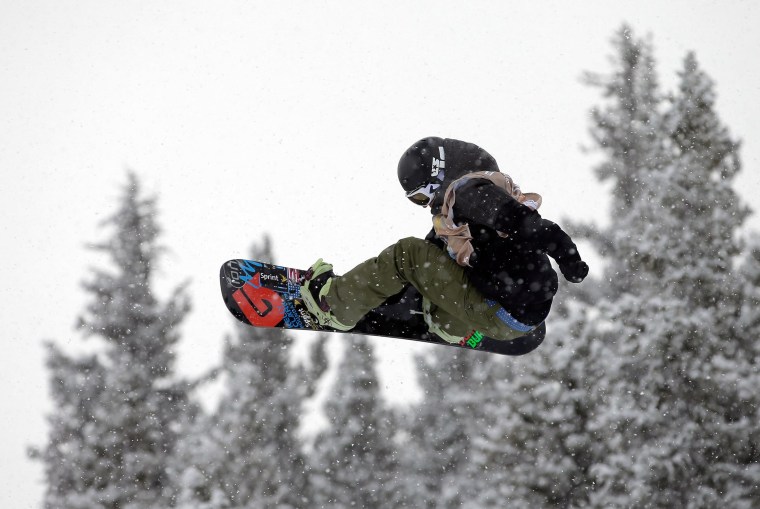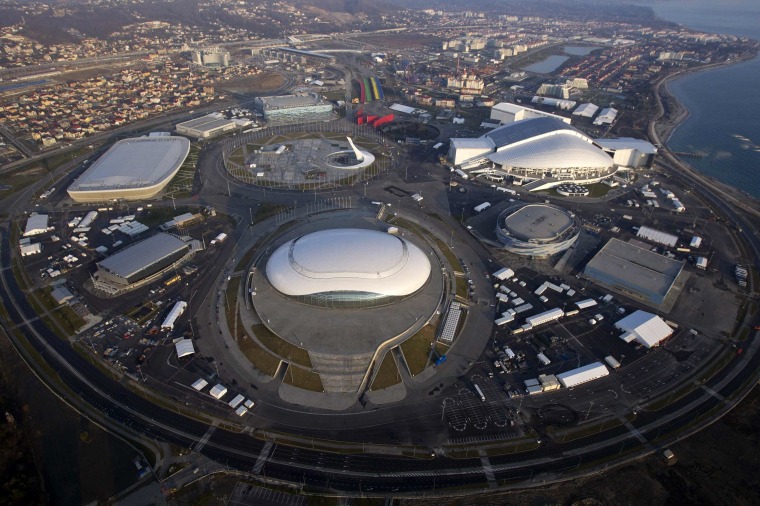A catastrophic terrorist strike at the Sochi Winter Olympics would present the United States with a logistically mind-boggling and diplomatically delicate challenge — how to get more than 200 American athletes safely out of Russia.
U.S. military officials have described plans to use two warships in the Black Sea and planes already on standby in Europe to evacuate Americans if the worst fears of security experts come true.
But these are the Olympics of President Vladimir Putin, who is spending a reported $50 billion on the games, including a purportedly impenetrable “ring of steel” around the Olympic city, and who sees the games through a prism of national pride.
Any American rescue operation would depend heavily on his approval, security experts say. And that’s unlikely if not impossible.
“As far as being able to do things without Russian cooperation, it’s basically a nonstarter,” said Andrew Weiss of the Carnegie Endowment for International Peace, a former Russia expert in the Clinton White House and an NBC News analyst.
“This is their territory, their country,” he said. “They get to decide what kind of outside help they need.”
Fears of Olympic terror have grown in the countdown to the games, which formally open Feb. 7. In the past week, a militant video has promised a “surprise” in Sochi, and Russia has hunted for at least five suspected terrorists who may have designs on an attack.
American precaution
The U.S. Olympic Committee declined to discuss the details of security for the American athletes or what would happen in the event of an evacuation.
“The safety and security of Team USA is our top priority,” Patrick Sandusky, a USOC spokesman, said in a statement.
“As is always the case, we are working with the U.S. Department of State, the local organizers and the relevant law enforcement agencies in an effort to ensure that our delegation and other Americans traveling to Sochi are safe,” he said.
But at least part of the American contingent for Sochi, the skiing and snowboard teams, is paying a private company, Global Rescue, for additional security.
The company promises communications help, “rally points” for athletes to shelter in place and ways to get them around, or out of, Sochi. Dan Richards, the CEO, said in an interview that Global Rescue has six aircraft that it could “utilize for rapid response.”
Exactly how that would work — a private security company landing its planes in or around Sochi in the immediate aftermath of an attack — is not clear, and Richards declined to provide details of the company’s plans.
Global Rescue also offers its services to individuals and companies, and in recent years has helped customers during the Arab Spring, the earthquake in Haiti and the tsunami and nuclear crisis in Japan.
“In every major crisis we’ve been involved with, we’ve never had host governments deny us overflight or landing permission,” he said. “The likelihood is that we’ll all work together, the Russians, our government, other friendly government and other private companies.”
Richards would not say what the U.S. Ski and Snowboard Association is paying for the additional protection. The skiers and snowboarders are among the richer American teams.
The American luge team — 10 athletes and four coaches, plus medical and support staff — will rely on the U.S. Olympic Committee, said Gordy Sheer, the team’s director of marketing and sponsorship.
“They’re working pretty hard, and we’ve been given a lot of assurances,” he said in a phone interview. “I feel that the USOC is really making it a priority, and obviously the Russians are as well.”
Difficult decision for athletes
There are signs of concern among American athletes. Some, including at least two members of the high-profile hockey team, have told their families not to travel to Sochi to cheer them on.
“I’m actually really concerned about it,” Zach Parise, one of the hockey players, told the Star Tribune of Minneapolis-St. Paul. “I know they say they have evacuation stuff for us and all, but you just never know. I guess you have to wonder at what point does someone say it isn’t a good idea for us to go.”
The biathlon team has bought satellite phones for its coaches and is recommending that traveling families of its 10 athletes purchase medical and evacuation insurance — the same already provided to Olympic athletes by the USOC — should anything go wrong, said Max Cobb, president and CEO of U.S. Biathlon.

Other American athletes say their minds are on getting ready for competition.
“I’m not worried about any safety issues in Russia at this point,” said Kelly Clark, a snowboarder competing in her fourth Winter Games. “We’re so focused on our competition and on our sport.”
Olympic diplomacy
U.S. officials say the terror threat is higher than at any previous Olympics. The State Department will have diplomatic security officers in Sochi, though it has declined to say how many, and the FBI will have a presence as well.
“The Russian government has the lead here for security,” Marie Harf, a State Department spokeswoman, told reporters. “Obviously we’ve said we’re happy to assist in any way we can, certainly for American citizens.”
President Barack Obama spoke with Putin this week about Olympic security, and Russia has raised the possibility of the Americans’ sharing bomb-detecting technology for the games. That would mean having American military personnel on the ground to help.
But senior defense officials told NBC News on Wednesday that there was little or no chance that the technology could be in place in time. It would take months to train the Russians, and there has been no discussion of using the system in Sochi under total American control, they said.
And the Olympics take place at a time of frayed U.S.-Russian relations — tested by the Edward Snowden affair and the Boston Marathon bombings — not to mention the long shadow of the Cold War.
A large-scale attack would trigger almost unimaginable complications, said Weiss, the Russia expert.
For example: At least 85 countries and 2,500 athletes are taking part in the games. Sochi has a fairly small airport, so who gets to fly out first? And why should the Americans be given priority?
“Something that looks like the U.S. cavalry riding to rescue Russia or Vladimir Putin from an attack seems — well, it’s just hard to imagine that happening,” he said. “Ultimately, it’s all on Russia.”
Catherine Chomiak, Courtney Kube, Jim Miklaszewski and Andrea Mitchell of NBC News contributed to this report.
